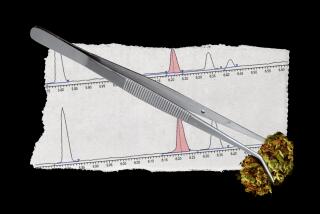Markets Must Prove Apples Are Alar-Free
- Share via
Although the federal Environmental Protection Agency assured consumers that the traces of the chemical Alar found in apples were no threat to humans, one factor that helped quell the confusion and consumer fear several months ago was the assurances from many markets that they would not stock and sell apples that had been treated with the spray that has been linked to cancer.
Those assurances lost a lot of validity last Sunday when The Times Orange County Edition reported that tests in a random survey of apples being sold in Orange County supermarkets revealed that some apples sold as Alar-free did indeed contain levels of the chemical.
The testing, conducted for The Times by a private San Francisco laboratory, found the presence of Alar in about 25% of the samples purchased from five Orange County supermarkets. Each market had indicated that it was selling Alar-free apples. But apples from four of the five contained Alar. Mother’s Market and Kitchen in Costa Mesa was the exception.
The levels discovered in apples from Vons Pavilion in Buena Park, Albertson’s in Cypress, Alpha Beta in San Clemente and Irvine Ranch Farmers Market in Irvine ranged from 0.97 to 4.59 parts per million. That is well below the EPA’s allowable limit of 20 p.p.m., but, as one EPA spokesman said, no detectable amount of Alar is without risk. The chemical daminozide, sold under the name of Alar, is used on apple crops to help keep the fruit on the tree longer and extend its shelf life. But because of its link to cancer the EPA is expected to ban its use next year.
In the meantime, the immediate problem for county consumers is being able to determine what apple products contain the chemical. And being able to believe the claims of stores that say the apples they sell really are Alar-free.
Market officials expressed surprise at the test results. They said their policy was to buy non-Alar-treated apples and that they were assured by their suppliers that they were receiving, as ordered, apples that were not sprayed with the chemical.
Surprise, embarrassment and even anger, however, are inadequate substitutes for what the markets should have been providing--consistent testing to ensure that the safeguards they represent to shoppers actually do exist.
The state must share responsibility for that misrepresentation, however unintentional, because its Food and Agriculture Department did the testing for at least one of the supermarket chains that says it thought its apples were Alar free, but were not.
There may be disagreement on exactly what level of Alar residue is harmful in the long run and short run, but there is no problem with the testing procedures that show whether the fruit has been treated and how much Alar it contains. Any market claiming its apples are Alar-free has the obligation to consistently test new crops and pull from its shelves any apples with any trace of the chemical.
More to Read
Sign up for Essential California
The most important California stories and recommendations in your inbox every morning.
You may occasionally receive promotional content from the Los Angeles Times.













